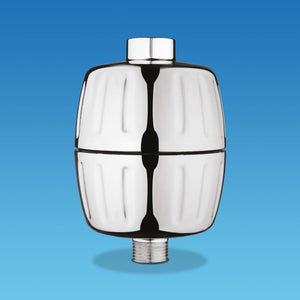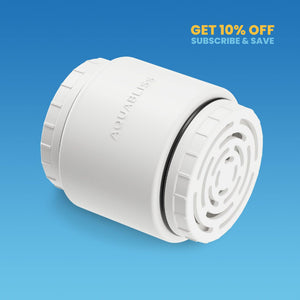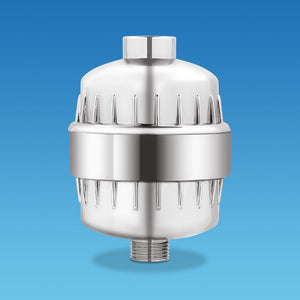Although there are many uncertainties in life, one of them is not whether people will age. Aging is a biological process stemming from cellular and molecular damage accumulating over time.
The hardest part about tackling it is that there is no single “key” that explains why it happens, the rate at which it does, or any specific thing that you can do to stop it. However, that does not mean there aren’t ways to reduce the signs of aging and improve skin health. In fact, many people are searching for answers to questions like “How to Reduce Signs of Aging Skin?”
Many simple habits and lifestyle changes can significantly help to slow several things like wrinkles and fine lines. One of the most commonly asked questions is, “What are some ways to slow the effects of aging on the skin?”
The good news is that there are easy steps you can take starting today that will have a big impact.
The Science of Aging Skin - The Natural Aging Process
Premature aging of the skin happens throughout the body, but one of the most prominent and visible ways to detect it is by looking at fine lines and wrinkles. For those wondering how to reduce signs of aging skin, understanding the underlying causes can be a helpful first step.
Although the research behind the exact mechanisms contributing to signs of aging and poor skin health isn't conclusive, most scientists agree that aging is the result of damage to the tissues and cells.
That damage accumulates and can’t be repaired due to the body’s inability to function as it ages. What is not as clear is what the actual cause of molecular damage is and why the body loses its ability to repair itself over time.
Aging of the skin is generally caused by both internal and external factors. Over time, skin elastin and collagen synthesis decrease by 1% annually. Therefore, aging leads to connective tissue disorganization. The result is a depletion of elastin and collagen, which causes wrinkles in the dermis layer of the skin.
External Factors Leading to Accelerated Aging Skin

Along with the internal factors leading to a reduction of elastin and collagen, there are external factors that play a role in the progression of premature aging. To reduce signs of aging skin, it’s important to consider these environmental hazards. The four most common factors that contribute to increased aging of the skin are exposure to the sun, smoking, pollution, and dehydration.
Exposure to the sun expedites aging of the skin and can lead to lines and wrinkles. UV rays damage the skin via free radicals that hasten damage to elastin fibers.
UV rays have longer wavelengths that can penetrate deeply into the dermis, leading to harmful collagen fibers. In turn, it encourages the abnormal production of elastin, leading to photodamage and the risk of skin disease.
The Role of Hydration and Aging Skin
Science tells us that dehydration and skin aging are highly correlated. As a person ages, their skin thickens, which leads to a higher risk of dehydration. When skin is dehydrated, it does not have the proper defenses against external factors of aging skin, making it harder to reduce signs of aging skin.
When the skin is dehydrated, it can make existing fine lines and wrinkles appear more prominent and sensitive. Dehydration of the skin also makes your skin’s complexion and texture appear rough and saggy.
Hydration is an important component of keeping your skin protected against external factors that can lead to cellular damage, aging, and skin conditions. Proper hydration can help to prevent premature aging.
Other Factors Affecting Skin Aging and Skin Problems
Along with UV rays, pollution, diet, and hydration, other things can affect the progression of skin aging, reducing a youthful appearance. Daily habits can affect not only the immediate appearance of your skin; over time, they can lead to premature and permanent aging.
Why Does My Face Get So Dry After a Shower?
Often people ask, “Why does my face get so dry after a shower?” Hot water can be one of the biggest insults to your skin and its youthful appearance. Frequently, there is nothing more soothing than a hot shower.
Just because it soothes your aching muscles, that doesn’t mean it is good for your skin. Science tells us that hot water can eliminate essential and healthy skin oils called sebum.
When sebum is depleted, it leads to visible signs of flakiness, heightened sensitivity and redness, and drying of the skin. Hot water can compromise the natural protective barrier of the skin, which helps to keep out external irritants and skin problems.
The skin has a natural defense mechanism of protection. Hot water can weaken the skin’s ability to protect itself and leave it vulnerable to both immediate and long-term damage.
The impact of hot water on the skin will disrupt the natural defense and balance that gives it a more youthful appearance. Studies show that keeping water temperature at or less than body temperature is the best way to save your skin from the harm associated with hot water.
By reducing the insult of hot water and choosing a more tepid temperature, it is possible to reduce stripping the skin of sebum, irritation, and redness and sustain healthier skin for the long term, helping to reduce signs of aging skin.
12 Ways to Slow the Skin Aging Process
Until science can concoct a fountain of youth, aging will necessarily have to be the natural progression of getting older.
The good news, however, is that the rate at which your skin ages can be significantly decreased by changing your lifestyle habits, taking simple steps to limit damage, and making better choices to reduce both internal and external damage.
Reduce Exposure to UV Rays

A healthy lifestyle includes covering up! One of the best ways to reduce fine lines and how to reduce signs of aging is by limiting the time spent under direct sunlight.
UV damage can lead to fine lines, wrinkles, and an increased risk of skin disease. Although sunscreen is helpful, it is best to be mindful of your time outdoors as well as the time of the day that you are outdoors.
Quit Smoking
If you smoke, don’t. Smoking is not only toxic to internal systems; it will also lead to fine lines and wrinkles. One of the best ways to reduce wrinkles is to put the cigarette out for good.
Reduce Exposure to Pollution
Pollution and chemicals in the environment can lead to free radical damage and premature aging. To learn how to reduce signs of aging, when possible, avoid being outdoors during high pollution times and days. In the same respect, get outdoors frequently. Often, indoor air pollution is higher than pollution levels outside.
Get the Proper Rest
Resting is an important part of maintaining a healthy lifestyle. Science tells us that not getting enough quality sleep can lead to an inadequate supply of a chemical called somatotropin, which can accelerate signs of aging and lead to visible signs of premature aging.
Gentle Skin Care Practices

Be kind to your skin. All too often, the last thing we give any care to is the skin. Be cognizant of the chemicals that you use on your skin and body. When possible, choose organic soaps, moisturizers, and cleansers. Also, supply the skin with natural oils and moisturizers to keep it well-hydrated and protected. And most importantly, stay hydrated!
Say No to Tanning
A tan used to be misconstrued as “healthy.” One of the best ways to reduce signs of aging is to say no to tanning. The harmful effects of UV rays will not only expedite premature aging; they can also lead to an increased risk of skin cancer and other diseases. Choose other ways to get the sun-kissed look, like natural spray tans and skin darkeners.
Exercise Regularly
Exercise has been proven to aid in longevity, health, and overall wellness. Regular exercise can slow down aging by increasing blood flow and supplying the cells with oxygen-rich blood and nutrients. It also helps to remove toxins and waste from the skin cells.
Sunscreen is a Must

Exposure to the sun is necessary to boost vitamin D levels, but UV rays can lead to cellular skin damage. Studies show that the use of sunscreen can slow the signs of aging. When in direct sunlight, always use SPF 15 or more. Also, apply it often, especially if you go swimming. If sweating through exercise or excessive heat, more is better.
Limit Caffeine and Alcohol
Dietary and daily habits are a simple way to reduce signs of aging in your skin. Alcohol and caffeine can expedite the dehydration process. They are both considered diuretics that make the body lose necessary fluids. When partaking, combat consumption by increasing water intake.
Eat a Balanced Diet
What a person eats is reflected in their skin. When a person feels better, they look better. According to studies, diet has a clear effect on the status and appearance of the skin.
Not getting the proper nutrition, vitamins, and minerals will prematurely age the appearance of the skin. Focus on a balanced diet, stay away from high-fat foods, choose organic when possible, and increase the consumption of fresh fruits and vegetables.
Incorporate Relaxation and Massage Techniques
Repetitive facial movements, like smiling, frowning, and squinting, can lead to the formation of fine lines and wrinkles. To learn how to reduce signs of aging, try relaxation techniques, and make sure to use sunglasses to reduce squinting. Massage and facials might also help to reduce stress that can ultimately show on your face.
The Effects of Chlorine, Chloramine, and Harsh Chemicals - Does Chlorine Age the Skin?
One of the most common questions about the aging of the skin is, “Does chlorine age the skin?” Other offenders of healthy skin are chlorine, chloramine, and additional harsh chemicals.
Chlorine contains chemicals that are used to sanitize water. It contains several hazardous chemicals, including hypochlorous acid and hypochlorite ions, that are meant to kill harmful microorganisms and bacteria found in water.
It is an additive that is meant to make water harmless for people to use and ingest. Although it’s sometimes necessary, chlorine can damage the skin and lead to premature aging. That is why adding a filtration system to your shower is an excellent way to reduce chemicals that expedite aging.
Damage Caused by Chlorine
One of the biggest harms of chlorine is that it can lead to dry skin because it is an irritant. Chlorine opens the pores of the skin and then strips it of natural moisturizers and oils that keep the skin healthy.
Exposure to chlorine often leads to itchiness and irritation. Over time, it can affect the overall natural balance and defenses of the skin, resulting in fine lines and wrinkles.
Chlorine can also lead to burns and rashes in high concentrations. Using an excellent filtration system can reduce signs of aging by minimizing damage caused by chlorine and reducing redness, wrinkles, sagging, and fine lines.
Combat Skin Aging with AquaBliss Shower Filters

AquaBliss Multi-Stage Shower Filter (SF220) reduces moderate levels of Chlorine, and pesticides, and controls lime scale buildup, dirt, and bad odors. The SF220 model will reduce low to moderate levels of chlorine. AquaBliss shower filters contain KDF-55, which has been shown to reduce heavy metals.
Reducing chlorine levels can significantly improve the feel and look of your skin and hair. No more itchy, dry, or red patches on your skin and some customers even report they no longer need moisturizers after their shower.
Are you ready for softer skin and hair? AquaBliss HD Multi-Stage Shower Filter (SF500) is the Heavy Duty version of the SF220, which reduces high levels of Chlorine by 97%+, pesticides, pharmaceuticals, and controls lime scale buildup, dirt, and bad odors.
AquaBliss shower filters contain KDF-55, which has been shown to reduce heavy metals. The SF500 also has external sediment pads which is great for heavy sediment issues since you can rinse/replace the sediment pads to keep the water flowing freely.
By reducing chlorine, chloramine (chlorine+ammonia) in your shower water you will help alleviate dry skin and the premature signs of aging. AquaBliss customers also report significant positive results when using the AquaBliss Revitalizing Shower Filter (SF100) for other skin issues like eczema and dermatitis.
If you are unsure about which shower filter model is best suited for your specific issues, please contact customer care directly and they will review your water quality report and make a suggestion as to the best shower filter for your specific concerns. Link support@aquabliss.com or visit Amazon.
Hydration Is the Key
Both for the immediate appearance of your skin and for the long term, stay hydrated. Although everybody is different, science tells us that it is a good idea to drink a minimum of eight glasses of water or more a day.
If you’re losing excessive hydration due to high temperatures, increase your water intake accordingly. By the time anyone feels thirsty, their body is already experiencing the effects of dehydration and premature aging.
There is no way to leave this earth without aging, but that doesn’t mean that you have to just grow old gracefully. Many simple lifestyle changes and preemptive habits can help to slow signs of aging.
The good news is that people can make a significant impact on aging and live happier and healthier lives by being mindful of hydration and other health decisions they make.







